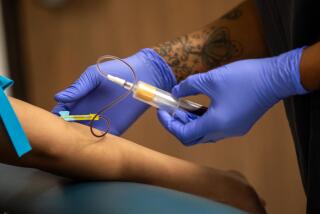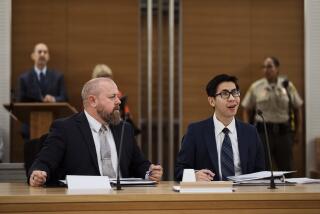San Diego Judge OKs AIDS Tests of Some Infants
- Share via
SAN DIEGO — In a highly unusual example of judicial activism, a San Diego judge has issued an order allowing county authorities to compel AIDS testing of newborns deemed to be at risk for the disease.
Without a case or a court hearing or even litigants, Napoleon Jones, the presiding judge of the San Diego Juvenile Court, quietly issued the directive several months ago, calling it a “general order,” court records indicate.
Six babies have been tested since the order went into effect July 1, county officials said Thursday. The results of the tests were not released because of confidentiality concerns.
The order, which came to light only after last week’s disclosure by basketball star Earvin (Magic) Johnson that he had tested positive for the virus that causes AIDS, underscores the complex ethical, legal and medical issues at work as the law grapples with the spread of the virus.
Attorneys familiar with the order said it was extremely uncommon for a judge to make such a sweeping ruling, especially since there was no case before him. And civil libertarians protested Thursday that judges lack authority to simply promulgate orders on issues of social concern.
But court officials, county staff and doctors praised the order because of its aim to save or prolong life.
“There are due process rights involved. But there are also other realities involved. That’s what makes it such a tough call,” said James P. Steyer, an attorney and president of Children Now, a leading statewide children’s advocacy group. “The bottom line is this is one of those questions with no easy answers.”
Jones could not be reached Thursday for comment. He issued the order at the recommendation of a panel that included attorneys, medical experts and Juvenile Court Referee Bonnie Dumanis.
“I do remember that we had discussions about balancing the various interests, but it was the overriding best interests of the minor that led us to do what we did,” Dumanis said.
The order covers any hospital in San Diego County with a delivery room, county staff said.
It applies when a nurse or social worker develops concern that the mother is at risk for HIV, the virus that causes AIDS, because the mother is--or is suspected to be--an intravenous drug user or has had multiple sex partners whose medical histories are unknown.
Under the order, hospital officials or social workers can ask the mother to consent to a test of her blood or the baby’s blood. If the mother refuses, or if the mother disappears from the hospital without the baby, the order gives the county Department of Social Services the authority to mandate the test and to receive the results.
Leesa Solit, program specialist with the Children’s Services Bureau of the county Department of Social Services, declined to discuss whether any tests were taken over parental protest.
Solit said that in the majority of cases in which the test has been used, “the whereabouts of the mother are unknown or (she) has become deceased.” Solit would not disclose the cause of any death.
Dr. Stephen Spector, a professor of pediatrics and the chief of infectious diseases at the UC San Diego Medical Center, also said the order is vital.
“As with many diseases, the earlier we make a diagnosis and are aware of a child having problems, the earlier we can make interventions that will have a positive impact on the child’s life,” he said.
Solit said county social workers and doctors had been suggesting for several years that the Juvenile Court issue an order permitting HIV tests on newborns.
It wasn’t until earlier this year that the idea caught on, she said. Jones signed it May 7.
And it wasn’t until Magic Johnson’s dramatic announcement last week that San Diego lawyers notified The Times of the order.
Civil libertarians said Thursday that they had no quarrel with the medical or emotional concerns of helping babies. But, they said, a judge’s order was not the proper legal way to tackle the issue.
The order “doesn’t give (a mother and baby) an adequate opportunity to have the court consider the fairness of that order in that particular case,” said Betty Wheeler, legal director of the San Diego chapter of the American Civil Liberties Union. “And that is what courts are about--a fair result in an individual case.”
More to Read
Sign up for Essential California
The most important California stories and recommendations in your inbox every morning.
You may occasionally receive promotional content from the Los Angeles Times.













